
Dead End is a 1937 crime drama film directed by William Wyler. It is an adaptation of the Sidney Kingsley 1935 Broadway play of the same name. It stars Sylvia Sidney, Joel McCrea, Humphrey Bogart, Wendy Barrie, and Claire Trevor. It was the first film appearance of the acting group known as the Dead End Kids.

Meet Me in St. Louis is a 1944 American Christmas musical film made by Metro-Goldwyn-Mayer. Divided into a series of seasonal vignettes, starting with Summer 1903, it relates the story of a year in the life of the Smith family in St. Louis leading up to the opening of the Louisiana Purchase Exposition in the spring of 1904. The film stars Judy Garland, Margaret O'Brien, Mary Astor, Lucille Bremer, Tom Drake, Leon Ames, Marjorie Main, June Lockhart and Joan Carroll.

Blossoms in the Dust is a 1941 American biographical film directed by Mervyn LeRoy and starring Greer Garson, Walter Pidgeon, Felix Bressart, Marsha Hunt, Fay Holden and Samuel S. Hinds. It tells the true story of Edna Gladney, who helped orphaned children find homes and began a campaign to remove the word "illegitimate" from Texas birth certificates, despite the opposition of "good" citizens. The screenplay was by Anita Loos, with a story by Ralph Wheelwright.

James Francis Durante was an American actor, comedian, singer, vaudevillian, and pianist. His distinctive gravelly speech, Lower East Side accent, comic language-butchery, jazz-influenced songs, and prominent nose helped make him one of America's most familiar and popular personalities of the 1920s through the 1970s. He often referred to his nose as the schnozzola, and the word became his nickname.
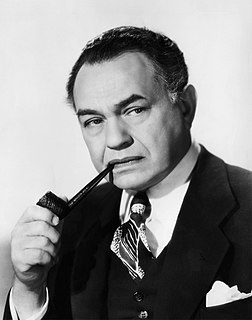
Edward G. Robinson was an American actor of stage and screen, born in Romania, who was popular during the Hollywood's Golden Age. He appeared in 30 Broadway plays and more than 100 films during a 50-year career and is best remembered for his tough-guy roles as gangsters in such films as Little Caesar and Key Largo. During his career, Robinson received the Cannes Film Festival Award for Best Actor for his performance in House of Strangers.
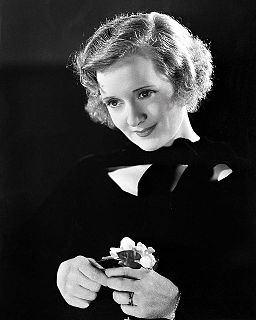
Mary William Ethelbert Appleton Burke was an American actress who was famous on Broadway and radio, and in silent and sound films. She is best known to modern audiences as Glinda the Good Witch of the North in the Metro-Goldwyn-Mayer movie musical The Wizard of Oz (1939).

The Petrified Forest is a 1936 American film directed by Archie Mayo and based on Robert E. Sherwood's 1935 Broadway drama of the same name. The motion picture stars Leslie Howard, Bette Davis and Humphrey Bogart. The screenplay was written by Delmer Daves and Charles Kenyon, and adaptations were later performed on radio and television. The film is set in Petrified Forest National Park in Arizona.

Babes on Broadway is a 1941 American musical film starring Mickey Rooney and Judy Garland and directed by Busby Berkeley, with Vincente Minnelli directing Garland's big solo numbers. The film, which features Fay Bainter and Virginia Weidler, was the third in the "Backyard Musical" series about kids who put on their own show, following Babes in Arms (1939) and Strike Up the Band (1940). Songs in the film include "Babes on Broadway" by Burton Lane (music) and E.Y. "Yip" Harburg (lyrics), and "How About You?" by Lane with lyrics by Ralph Freed, the brother of producer Arthur Freed. The movie ends with a minstrel show performed by the main cast in blackface.

Cimarron is a 1960 American Western film based on the Edna Ferber novel Cimarron. The film stars Glenn Ford and Maria Schell and was directed by Anthony Mann and Charles Walters, though Walters is not credited onscreen. Ferber's novel was previously adapted as a film in 1931; that version won three Academy Awards.
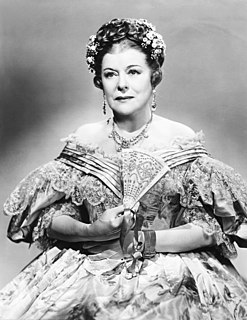
Mary Boland was an American stage and film actress.

The Catered Affair is a 1956 American comedy-drama film directed by Richard Brooks and produced by Sam Zimbalist from a screenplay by Gore Vidal, based on a 1955 television play by Paddy Chayefsky. The film stars Bette Davis, Ernest Borgnine, Debbie Reynolds, Barry Fitzgerald and Rod Taylor. It was Taylor's first film for Metro-Goldwyn-Mayer after signing a long-term contract with the studio. The film score was by André Previn and the cinematographer was John Alton.

Bad Sister is a 1931 American pre-Code drama film directed by Hobart Henley. The screenplay by Edwin H. Knopf, Tom Reed, and Raymond L. Schrock is based on the 1913 novel The Flirt by Booth Tarkington, which had been filmed in 1916 and 1922.

Ziegfeld Girl is a 1941 American musical film directed by Robert Z. Leonard and starring James Stewart, Judy Garland, Hedy Lamarr, Lana Turner, Tony Martin, Jackie Cooper, Eve Arden, and Philip Dorn. The film, which features musical numbers by Busby Berkeley, was produced by Metro-Goldwyn-Mayer.
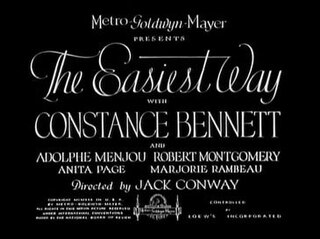
The Easiest Way is a 1931 American pre-Code MGM drama film directed by Jack Conway. Adapted from the 1909 play of the same name written by Eugene Walter and directed by David Belasco, the film stars Constance Bennett, Adolphe Menjou, Robert Montgomery, Marjorie Rambeau, Anita Page, and Clark Gable

Mr. Wu is a 1927 American silent drama film directed by William Nigh, based on a 1913 stage play. It stars Lon Chaney as a Chinese patriarch who tries to exact revenge on the Englishman who seduced his daughter. The supporting cast includes Anna May Wong.

Mary Philips was an American stage and film actress.
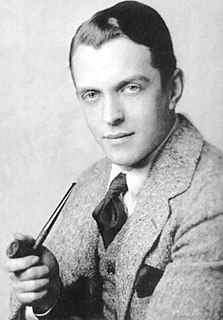
Kenneth MacKenna was an American actor and film director.
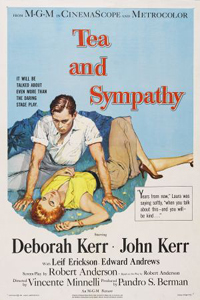
Tea and Sympathy is a 1956 American drama film and an adaptation of Robert Anderson's 1953 stage play of the same name directed by Vincente Minnelli and produced by Pandro S. Berman for MGM in Metrocolor. The music score was by Adolph Deutsch and the cinematography by John Alton. Deborah Kerr, John Kerr and Leif Erickson reprised their original Broadway roles. Edward Andrews, Darryl Hickman, Norma Crane, Tom Laughlin, and Dean Jones were featured in supporting roles.

The Actress is a lost 1928 American silent drama film produced and distributed by Metro-Goldwyn-Mayer. The film was directed by Sidney Franklin, and starred Norma Shearer.

Morals for Women is a 1931 American pre-Code talking film produced and released by Tiffany Pictures, often considered a low budget studio. The film stars Bessie Love and Conway Tearle. It is preserved at the Library of Congress, has been released on DVD, and is in the public domain.




















